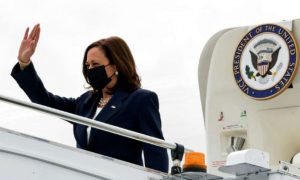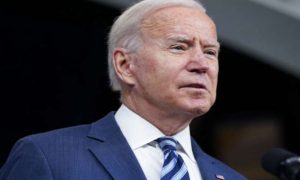Former President Donald Trump’s attempt to steal the 2020 election is being revealed week-by-week to be deeper and broader than it initially appeared, sharpening the national dilemma of if and how he could ever be held to account.
Even as a federal judge commented Monday that Trump “more likely than not” sought to commit a crime to stay in office last year, the ex-President’s attacks on democracy are intensifying. They were on display as recently as Saturday night in a lie-filled rally that underscored how his conspiracy to overturn the election — whether it is criminal or not — remains viscerally alive and able to damage future elections.
While much of the country has been transfixed by Russia’s brutal war in Ukraine, the House committee investigating the insurrection has been racing against the clock ticking down to its own likely demise if Republicans win back the House in November’s midterms. It took another step on Monday toward holding two former Trump advisers to account by advancing criminal contempt referrals.
It’s extraordinary that, more than 14 months on, new details of efforts by Trump and those around him to subvert President Joe Biden’s victory are still emerging. It’s also ironic that this threat to American democracy is being further exposed while Washington leads an international effort to save freedom in Ukraine, which is under much greater assault from Russian President Vladimir Putin, whom Trump still seems to hero worship.
Here at home, a flurry of new details in recent days about the ex-President’s behavior justifies continued investigations into the worst attack on American democracy in decades. Those revelations also explain why pro-Trump Republicans were so keen to prevent the House select committee investigating January 6, 2021, from ever getting off the ground. And they inject a new political dimension into Trump’s attempted comeback as he casts the 2022 midterm elections as a referendum on the lie that he won in 2020 and seeks to build a return to the White House on the same falsehoods that have drawn in millions of his supporters.
Trump ‘more likely than not’ attempted to obstruct Congress
In one development on Monday that alone encapsulated the stunning events of the last election still hanging over the country, a federal judge wrote that it was “more likely than not” that Trump “corruptly attempted to obstruct” Congress in its certification of Biden’s election victory. Judge David Carter’s comment came as he ruled that emails from John Eastman, a conservative lawyer who helped craft Trump’s false argument that the 2020 election was stolen, should be handed over to the committee.
Carter can’t initiate a case against Trump. But his words didn’t just raise a blaring historical marker over a President committing a potential crime in office — and one that put the entire US democratic system at risk. His comment re-focused attention on the debate within the House committee over whether to make what would be a historic criminal referral of Trump to the Justice Department. Such a move would present Attorney General Merrick Garland with the earthshaking decision of whether to prosecute an ex-President who is maneuvering with a $100 million war chest in a potential bid to reclaim his job in 2024.
There could be few hotter political potatoes for an attorney general already facing political pressure to deal with Trump aides who are obstructing the committee.
Failing to pursue Trump in such circumstances would send a signal of impunity for presidents who seek to destroy American democratic institutions, even as Trump’s supporters who ransacked the US Capitol begin to be convicted and face prison terms for apparently acting on their political hero’s wishes.
But moving against Trump would ensure that the dark history of the 2020 election continues to dominate American politics for years to come because it would offer the ex-President new material for his claims that he’s persecuted by the political establishment. Tapping into that theme on Monday, Trump spokesman Taylor Budowich slammed Carter’s ruling as “just another example of how the left is weaponizing every branch of government against President Trump.”
But the panel hit back.
“The Court’s opinion also includes a warning: that a failure to pursue accountability could set the stage for a repeat of January 6th,” Committee Chairman Bennie Thompson, a Mississippi Democrat, and Vice Chair Liz Cheney, a Wyoming Republican, said in a statement on Monday.
“America must not allow what happened on that day to be minimized and cannot accept as normal these threats to our democracy,” they said, clearly trying to emphasize the enduring relevance of the Capitol riot as the political clock races on.
Supreme Court dragged into the mire
Monday’s developments rocked Washington as it was still coming to terms with the implications of last week’s revelations that Virginia “Ginni” Thomas, wife of Supreme Court Justice Clarence Thomas, had aggressively tried to support Trump’s attempts to cling to power in late 2020 and early 2021. There’s no indication her husband was involved in attempts to subvert a legal election.
But the reputation of the Supreme Court relies on the assumption of impartiality and avoiding any appearance of ethical issues. This issue has now dragged the top bench directly into the aftermath of January 6, an outrage that is tainting every branch of the American government. And it came as Republican senators spent last week smearing Biden’s Supreme Court pick, Judge Ketanji Brown Jackson, with misleading claims she was soft on child pornography offenders, which could damage her reputation among some voters for years to come. Ironically, many of those same senators were among Trump’s most fervent enablers and apologists when he tore at the rule of law in the White House.
Multiple sources said Monday that the committee will seek an interview with Ginni Thomas over texts in its possession that show her pleading with then-White House chief of staff Mark Meadows to double down on efforts to block Biden’s victory.
“We want to hear from everybody who has something to say,” Rep. Jamie Raskin, a Maryland Democrat who serves on the committee, told CNN on Monday. “And she obviously interacted frequently with the president’s chief of staff and was actively involved with the effort to overturn the election. So, speaking as one member, I think it’s important that we hear from her.”
The Eastman angle
Carter delivered a fresh victory for the January 6 committee, which signaled on Monday it’s moving ahead in its investigation.
In ordering the handover of 101 emails held by Eastman from around January 6, 2021, the judge revealed new details about the documents the House panel can receive — including one that appears to be aiding Trump and Eastman’s alleged conspiracy to obstruct Congress: a draft memo written for another Trump attorney, Rudy Giuliani, recommending that Vice President Mike Pence reject some states’ electors during the January 6 congressional meeting.
Eastman was instrumental in crafting the plan for Pence to refuse to certify the election results in Congress based on false claims, disproven in court, that there had been massive fraud against Trump. Eastman “intends to comply with the court’s order,” his attorney Charles Burnham said.
But the Eastman angle is only one front on which the committee is pushing ahead. The ex-President’s son-in-law and senior White House adviser, Jared Kushner, is expected to voluntarily speak to the committee this week. And the committee voted Monday night to send to the full House a referral for criminal contempt regarding former Trump advisers Peter Navarro and Dan Scavino, both of whom rebuffed the panel.
Assuming the full House supports the referral, it will again be up to Garland to decide whether to move toward prosecutions. While the Justice Department did open a case against former Trump political guru Steve Bannon, who goes to trial in the summer, it has yet to weigh in on a similar contempt case against Meadows, who may have a far stronger executive privilege ground for refusing to testify.
Garland’s challenge shows that while the committee can make big symbolic moves, its capacity to force testimony may be limited ahead of its expected public hearings later this spring.
Some Democrats on the committee called on the Justice Department to do more to hold those Trump aides who refuse to testify to account through prosecution.
Rep. Zoe Lofgren of California warned: “This committee is doing its job. The Department of Justice needs to do theirs.”
Rep. Elaine Luria of Virginia called on the department to act swiftly, and showed real frustration with Garland. “I will echo what my colleagues have already said, but more bluntly, Attorney General Garland, do your job — so that we can do ours.”
Such frustrations raise the question of the committee’s broader impact. Millions of Americans who support the ex-President have already shown themselves willing to buy into denials of what happened on January 6, which have been advanced by Trump’s GOP acolytes.
But even though the committee, which has interviewed hundreds of witnesses and appears to have a stark story to tell, cannot itself bring Trump to justice, it can influence public opinion with its final report and public hearings.
If it succeeds in capturing the attention of the American people, it will implicitly ask voters whether they have the stomach for more years of lies from an ex-President who clearly lost an election that he insists he won.











































